John Deere 915 V-Ripper

| Make | John Deere |
| Model | 915 |
| Type | Vertical Tillage |
Your Preferred Location
Description
- Excellent residue-handling capability
- Integral hitch provides excellent maneuverability
- Single or dual gauge wheels available
- Coulter blades slice through surface residue
Models
Integral hitch provides excellent maneuverability
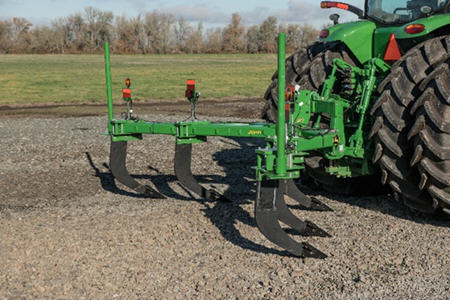 Integral hitch
Integral hitch
The integral hitch provides excellent maneuverability for tight turns on shorter headlands. The hitch makes it easy to move in and out of buildings.
It is compatible for tractors with Category 2 or Category 3N or 3, 3-point hitches.
The integral hitch can be set to two position:
- 1 = Low position
Gives maximum transport clearance and allows ripping to approximately 508 mm (20 in.) deep - 2 = High position
Enables ripping to a maximum depth of 584 mm (23 in.) with shear-bolt standards
Coulter blades slice through surface residue
Rippled coulter blades cut through surface residue such as cornstalks, wheat stubble, or other heavy crops to help reduce plugging.
The ripple on the blade bites into the soil to promote turning the blade in wet and/or firm soil, as well as lighter, drier soils.
Cushion or shear-bolt designs are available.
Cushion design
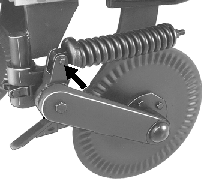 Cushion-designed coulter blades
Cushion-designed coulter blades
-
Automatically returns the coulter to the operating position once the obstruction is passed.
-
Saves time by eliminating the need to stop and replace shear bolts.
-
-
Unique rosette bracket used to adjust the coulter depth. Simply loosen one bolt and swing the coulter up or down to the desired height.
-
Standard does not move, so maximum trash clearance is retained.
-
-
Protector bolt (arrow) will yield if the obstruction height exceeds the deflection range of the coulter, thus preventing serious damage to the coulter.
-
457-mm or 508-mm (18-in. or 20-in.) rippled blades are available for good cutting action. The maximum working depth is as follows*:
-
For the 457-mm (18-in.) coulter blade, the working depth is 483 mm (19 in.)
-
For the 508-mm (20-in.) coulter blade, the working depth is 457 mm (18 in.)
-
*NOTE: When ripping in fields with obstructions, it is necessary to restrict the working depth in order to give the coulter space to travel over obstructions. Without coulters, the maximum working depth is 584 mm (23 in.) for shear-bolt standard and 559 mm (22 in.) for safety-trip and spring-reset standards.
Shear-bolt design
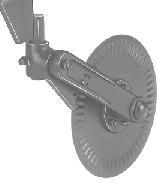 Shear-bolt design coulter blades
Shear-bolt design coulter blades
- Provides economical alternative for protecting coulters in fields with few obstructions.
- 457-mm, 508-mm, or 559-mm (18-in., 20-in., or 22-in.) rippled coulter blades are available for good cutting action. The maximum working depth is as follows:
- For 457-mm (18-in.) coulter blades, the working depth is 483 mm (19 in.)
- For 508-mm (20-in.) coulter blades, the working depth is 457 mm (18 in.)
- For 559-mm (22-in.) coulter blades, the working depth is 432 mm (17 in.)
Multiple frame sizes available
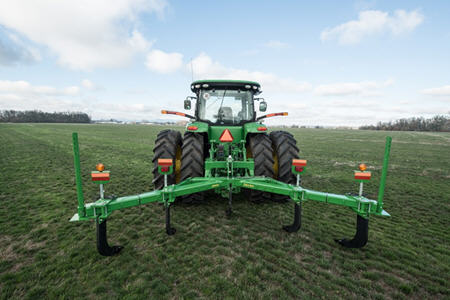 Five-standard 915 V-Ripper
Five-standard 915 V-Ripper
The frame is available in 127-mm x 178-mm (5-in. x 7-in.) and 178-mm x 178-mm (7-in. x 7-in.) sizes.
The frame design of the 915 V-Ripper positions standards in a true V-pattern:
- Reduces plugging in higher levels of residue
- Gives the center standard a leading-edge shattering effect that reduces horsepower requirements over straight bar rippers
 Strong 10-mm (3/8-in.) wall mainframe
Strong 10-mm (3/8-in.) wall mainframe
127-mm x 178-mm (5-in. x 7-in.) frame models have 10-mm (3/8-in.) thick walls:
- Ideal for tractors up to 225 PTO horsepower (hp) and 4WD tractors up to 250 engine hp
- Available in five- or seven-standard models
- Parking stands are included in base equipment
 Heavy-duty 13-mm (1/2-in.) wall mainframe
Heavy-duty 13-mm (1/2-in.) wall mainframe
178-mm x 178-mm (7-in. x 7-in.) frame models have 13-mm (1/2-in.) thick walls:
- Ideal for tractors with up to 360 engine hp
- Basic frame can be equipped with seven or nine standards
- Bolt-on extensions can be added to allow 11 or 13 standards
- Parking stands are optional equipment
NOTE:
- 11-standard size is limited to 508-mm and 635-mm (20-in. and 25-in.) spacings
- 13-standard size limited to 508-mm (20-in.) spacing
Excellent residue-handling capability in primary tillage at all residue levels
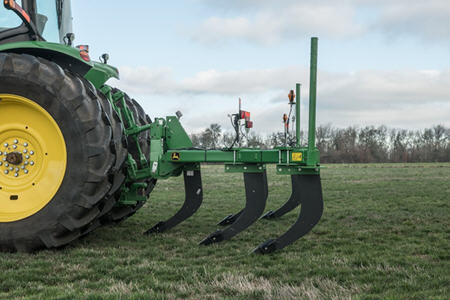 915 V-Ripper
915 V-Ripper
The 915 V-Ripper has excellent residue-handling capability in primary tillage at all residue levels. At higher levels, coulters may be required to minimize plugging.
Typical percentage of residue cover remaining from the 915 are listed as follows.
NOTE: The percentage do not take into account variables such as the condition of the residue, speed, and soil type.
| 508-mm (20-in.) models | ||
Starting |
Remaining |
Remaining |
100 |
60 |
50 |
90 |
55 |
45 |
80 |
50 |
40 |
70 |
40 |
35 |
60 |
35 |
30 |
50 |
30 |
25 |
40 |
25 |
20 |
| 762-mm (30-in.) models | ||
Starting |
Remaining |
Remaining |
100 |
60 |
50 |
90 |
55 |
45 |
80 |
50 |
40 |
70 |
40 |
35 |
60 |
35 |
30 |
50 |
30 |
25 |
40 |
25 |
20 |
*Non-fragile residue includes crops like corn, sorghum, wheat (more than 45 bu).
**Fragile residue includes crops like soybeans, edible beans, peas, wheat, (under 45 bu), sunflower, peanuts, cotton.
Single or dual gauge wheels available
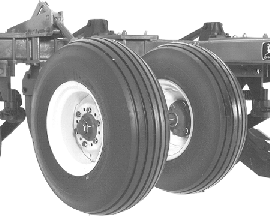 Dual gauge wheels
Dual gauge wheels
Single or dual gauge wheels are available to help maintain a consistent ripping depth:
- 9.5L-15, 8 PR tires for good flotation and load bearing when ripping deep
- Turnbuckle adjustment for easy setting
Soil probe helps to determine proper operating depth
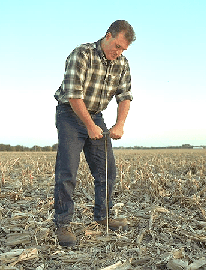 Soil probe
Soil probe

The soil probe helps operators to determine the proper operating depth of their ripper points,
38 mm (1.5 in.) below the bottom of the compaction layer.
The probe allows obtaining the maximum amount of soil fracturing from the entire family of John Deere ripper points. Marked in 51-mm (2-in.) increments from 254 mm to 559 mm (10 in. to 22 in.), the probe provides accurate feedback of compaction layer depth.
It is stored on the mainframe of the ripper for convenient access. The operator's manual explains the proper use of the soil probe.
Specifications
- Coulters - Blades: Shear bolt: rippled blades: 45.7 cm<br/>18 in.<br/>50.8 cm<br/>20 in.<br/>or 55.9 cm<br/>22 in.<br/>Cushioned: rippled blades: 45.7 cm<br/>or 50.8 cm
- Coulters - Type: Shear bolt or cushioned
- Depth control - Option 1: Intergral units are controlled by tractor, rockshaft, and gauge wheels
- Frame - Maximum underframe clearance: Shear-bolt: 90.2 cm<br/>35.5 in.<br/>Cushion-trip: 95.3 cm<br/>37.5 in.<br/>Safety-trip and spring-reset: 100.8 cm<br/>39.7 in.
- Hitch - Options: Integral
- Hitch - Three-point hitch requirements: Category 2,3 or 3N
- Key Specs - Operating depth: Maximum<br/>58.4 cm<br/>23 in.<br/>
- Key Specs - Spacings: 50.8 cm<br/>20 in.<br/>63.5 cm<br/>25 in.<br/>76.2 cm<br/>30 in.
- Key Specs - Transport width: Option 1: 4.2 m, 13.75 ft<br/>Option 2: 4.2 m, 13.75 ft<br/>Option 3: 4.2 m, 13.75 ft<br/>Option 4: 5.36 m, 17.58 ft<br/>Option 5: 5.36 m, 17.58 ft<br/>Option 6: 5.36 m, 17.58 ft<br/>Option 7: 5.36 m, 17.58 ft; Or with extensions: 6.91 m, 22.67 ft<br/>Option 8: 5.36 m, 17.58 ft; Or with extensions: 6.91 m, 22.67 ft<br/>Option 9: 5.36 m, 17.58 ft; Or with extensions: 6.91 m, 22.67 ft<br/>Option 10: 5.36 m, 17.58 ft; Or with extensions: 6.91 m, 22.67 ft
- Key Specs - Working width: Option 1: 2.5 m, 8.33 ft<br/>Option 2: 3.2 m, 10.42 ft<br/>Option 3: 3.8 m, 12.5 ft<br/>Option 4: 3.6 m, 11.67 ft<br/>Option 5: 4.44 m, 14.58 ft<br/>Option 6: 5.3 m, 17.5 ft<br/>Option 7: 4.6 m, 15 ft<br/>Option 8: 5.72 m, 18.75 ft<br/>Option 9: 6.9 m, 22.5 ft<br/>Option 10: 5.59 m, 18.33 ft
- Operating depth - Maximum: 58.4 cm<br/>23 in.
- Stabilizer/gauge wheels - Tires: 9.5L-15, 8PR
- Stabilizer/gauge wheels - Type: Gauge wheels
- Stabilizer/gauge wheels - Wheels: 12.7x17.8 cm<br/>5x7 in.
- Standard options - Option 1: Trip force<br/>5,443 kg<br/>12,000 lb<br/>Standard type<br/>Straight or parabolic with wear shin<br/>Shear-bolt
- Standard options - Option 2: Trip force<br/>2,540 kg<br/>5,600 lb<br/>Standard type<br/>Straight with wear shin or parabolic<br/>Safety-trip
- Standard options - Option 3: Trip force<br/>2,404 kg<br/>5,300 lb<br/>Standard type<br/>Straight with wear shin or parabolic<br/>Cushion-trip
- Standard options - Option 4: Trip force<br/>1,451.5 to 2,404 kg<br/>3,200 to 5,300 lb<br/>Standard type<br/>Parabolic<br/>Spring-reset rock standard
- Standard options - Spacings: 50.8 cm<br/>20 in.<br/>63.5 cm<br/>25 in.<br/>76.2 cm<br/>30 in.
- Tool configuration - Option 1: Standard: 5, spacing: 50.8 cm<br/>20 in.
- Tool configuration - Option 10: Standard: 11, spacing: 50.8 cm<br/>20 in.
- Tool configuration - Option 11: Standard: 11, spacing: 63.5 cm<br/>25 in.
- Tool configuration - Option 12: Standard: 13, spacing: 50.8 cm<br/>20 in.
- Tool configuration - Option 2: Standard: 5, spacing: 63.5 cm<br/>25 in.
- Tool configuration - Option 3: Standard: 5, spacing: 76.2 cm<br/>30 in.
- Tool configuration - Option 4: Standard: 5, spacing: 76.2 cm<br/>30 in.
- Tool configuration - Option 5: Standard: 7, spacing: 63.5 cm<br/>25 in.
- Tool configuration - Option 6: Standard: 7, spacing: 76.2 cm<br/>30 in.
- Tool configuration - Option 7: Standard: 9, spacing: 50.8 cm<br/>20 in.
- Tool configuration - Option 8: Standard: 9, spacing: 63.5 cm<br/>25 in.
- Tool configuration - Option 9: Standard: 9, spacing: 76.2 cm<br/>30 in.
- Tool configuration - Type: V-Ripper
- Transport width - Option 1: 4.2 m<br/>13.75 ft
- Transport width - Option 10: 5.36 m<br/>17.58 ft<br/>Or with extensions: 6.91 m<br/>21.67 ft
- Transport width - Option 11: 5.36 m<br/>17.58 ft<br/>Or with extensions: 6.91 m<br/>22.67 ft
- Transport width - Option 12: 6.91 m<br/>22.67 ft
- Transport width - Option 2: 4.2 m<br/>13.75 ft
- Transport width - Option 3: 4.2 m<br/>13.75 ft
- Transport width - Option 4: 5.36 m<br/>17.58 ft
- Transport width - Option 5: 5.36 m<br/>17.58 ft
- Transport width - Option 6: 5.36 m<br/>17.58 ft
- Transport width - Option 7: 5.36 m<br/>17.58 ft<br/>Or with extensions: 6.91 m<br/>22.67 ft
- Transport width - Option 8: 5.36 m<br/>17.58 ft<br/>Or with extensions: 6.91 m<br/>22.67 ft
- Transport width - Option 9: 5.36 m<br/>17.58 ft<br/>Or with extensions: 6.91 m<br/>22.67 ft
- Working width - Option 1: 2.5 m<br/>8.33 ft
- Working width - Option 10: 5.59 m<br/>18.33 ft
- Working width - Option 11: 5.99 m<br/>22.92 ft
- Working width - Option 12: 6.6 m<br/>21.67 ft
- Working width - Option 2: 3.2 m<br/>10.42 ft
- Working width - Option 3: 3.8 m<br/>12.5 ft
- Working width - Option 4: 3.6 m<br/>11.67 ft
- Working width - Option 5: 4.44 m<br/>14.58 ft
- Working width - Option 6: 5.3 m<br/>17.5 ft
- Working width - Option 7: 4.6 m<br/>15 ft
- Working width - Option 8: 5.72 m<br/>18.75 ft
- Working width - Option 9: 6.9 m<br/>22.5 ft
Copy Set
Integral hitch provides excellent maneuverability
 Integral hitch
Integral hitch
The integral hitch provides excellent maneuverability for tight turns on shorter headlands. The hitch makes it easy to move in and out of buildings.
It is compatible for tractors with Category 2 or Category 3N or 3, 3-point hitches.
The integral hitch can be set to two position:
- 1 = Low position
Gives maximum transport clearance and allows ripping to approximately 508 mm (20 in.) deep - 2 = High position
Enables ripping to a maximum depth of 584 mm (23 in.) with shear-bolt standards
Coulter blades slice through surface residue
Rippled coulter blades cut through surface residue such as cornstalks, wheat stubble, or other heavy crops to help reduce plugging.
The ripple on the blade bites into the soil to promote turning the blade in wet and/or firm soil, as well as lighter, drier soils.
Cushion or shear-bolt designs are available.
Cushion design
 Cushion-designed coulter blades
Cushion-designed coulter blades
-
Automatically returns the coulter to the operating position once the obstruction is passed.
-
Saves time by eliminating the need to stop and replace shear bolts.
-
-
Unique rosette bracket used to adjust the coulter depth. Simply loosen one bolt and swing the coulter up or down to the desired height.
-
Standard does not move, so maximum trash clearance is retained.
-
-
Protector bolt (arrow) will yield if the obstruction height exceeds the deflection range of the coulter, thus preventing serious damage to the coulter.
-
457-mm or 508-mm (18-in. or 20-in.) rippled blades are available for good cutting action. The maximum working depth is as follows*:
-
For the 457-mm (18-in.) coulter blade, the working depth is 483 mm (19 in.)
-
For the 508-mm (20-in.) coulter blade, the working depth is 457 mm (18 in.)
-
*NOTE: When ripping in fields with obstructions, it is necessary to restrict the working depth in order to give the coulter space to travel over obstructions. Without coulters, the maximum working depth is 584 mm (23 in.) for shear-bolt standard and 559 mm (22 in.) for safety-trip and spring-reset standards.
Shear-bolt design
 Shear-bolt design coulter blades
Shear-bolt design coulter blades
- Provides economical alternative for protecting coulters in fields with few obstructions.
- 457-mm, 508-mm, or 559-mm (18-in., 20-in., or 22-in.) rippled coulter blades are available for good cutting action. The maximum working depth is as follows:
- For 457-mm (18-in.) coulter blades, the working depth is 483 mm (19 in.)
- For 508-mm (20-in.) coulter blades, the working depth is 457 mm (18 in.)
- For 559-mm (22-in.) coulter blades, the working depth is 432 mm (17 in.)
Multiple frame sizes available
 Five-standard 915 V-Ripper
Five-standard 915 V-Ripper
The frame is available in 127-mm x 178-mm (5-in. x 7-in.) and 178-mm x 178-mm (7-in. x 7-in.) sizes.
The frame design of the 915 V-Ripper positions standards in a true V-pattern:
- Reduces plugging in higher levels of residue
- Gives the center standard a leading-edge shattering effect that reduces horsepower requirements over straight bar rippers
 Strong 10-mm (3/8-in.) wall mainframe
Strong 10-mm (3/8-in.) wall mainframe
127-mm x 178-mm (5-in. x 7-in.) frame models have 10-mm (3/8-in.) thick walls:
- Ideal for tractors up to 225 PTO horsepower (hp) and 4WD tractors up to 250 engine hp
- Available in five- or seven-standard models
- Parking stands are included in base equipment
 Heavy-duty 13-mm (1/2-in.) wall mainframe
Heavy-duty 13-mm (1/2-in.) wall mainframe
178-mm x 178-mm (7-in. x 7-in.) frame models have 13-mm (1/2-in.) thick walls:
- Ideal for tractors with up to 360 engine hp
- Basic frame can be equipped with seven or nine standards
- Bolt-on extensions can be added to allow 11 or 13 standards
- Parking stands are optional equipment
NOTE:
- 11-standard size is limited to 508-mm and 635-mm (20-in. and 25-in.) spacings
- 13-standard size limited to 508-mm (20-in.) spacing
Excellent residue-handling capability in primary tillage at all residue levels
 915 V-Ripper
915 V-Ripper
The 915 V-Ripper has excellent residue-handling capability in primary tillage at all residue levels. At higher levels, coulters may be required to minimize plugging.
Typical percentage of residue cover remaining from the 915 are listed as follows.
NOTE: The percentage do not take into account variables such as the condition of the residue, speed, and soil type.
| 508-mm (20-in.) models | ||
Starting |
Remaining |
Remaining |
100 |
60 |
50 |
90 |
55 |
45 |
80 |
50 |
40 |
70 |
40 |
35 |
60 |
35 |
30 |
50 |
30 |
25 |
40 |
25 |
20 |
| 762-mm (30-in.) models | ||
Starting |
Remaining |
Remaining |
100 |
60 |
50 |
90 |
55 |
45 |
80 |
50 |
40 |
70 |
40 |
35 |
60 |
35 |
30 |
50 |
30 |
25 |
40 |
25 |
20 |
*Non-fragile residue includes crops like corn, sorghum, wheat (more than 45 bu).
**Fragile residue includes crops like soybeans, edible beans, peas, wheat, (under 45 bu), sunflower, peanuts, cotton.
Single or dual gauge wheels available
 Dual gauge wheels
Dual gauge wheels
Single or dual gauge wheels are available to help maintain a consistent ripping depth:
- 9.5L-15, 8 PR tires for good flotation and load bearing when ripping deep
- Turnbuckle adjustment for easy setting
Soil probe helps to determine proper operating depth
 Soil probe
Soil probe

The soil probe helps operators to determine the proper operating depth of their ripper points,
38 mm (1.5 in.) below the bottom of the compaction layer.
The probe allows obtaining the maximum amount of soil fracturing from the entire family of John Deere ripper points. Marked in 51-mm (2-in.) increments from 254 mm to 559 mm (10 in. to 22 in.), the probe provides accurate feedback of compaction layer depth.
It is stored on the mainframe of the ripper for convenient access. The operator's manual explains the proper use of the soil probe.

